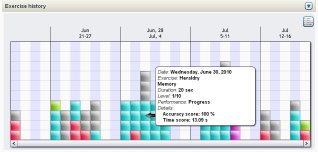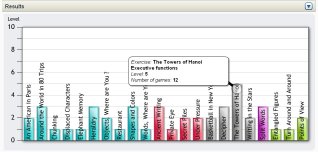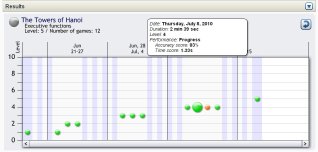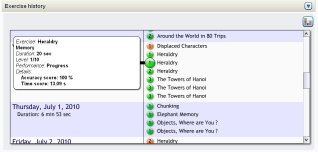The Moderate to Mild Cognitive Impairment Program
Testimonials
We have in our municipality experimented with HAPPYneuron Pro in a pilot study. The project was a great succes from the perspectives of the clients as well of the health professionals.
Mai Holm Timmerby Training Unit of Billund Municipality, Denmark
The Moderate to Mild Cognitive Impairment Program is a specialized program designed for those diagnosed with Mild Cognitive Impairment as well as healthy seniors who may be concerned about their cognitive abilities.
- A organized into 5 modules
- All exercises delivered through engaging interactive games
- Thousands of unique exercise combinations in each game
How to use it?
Results
Modules
Indications
Clinical studies
Testimonials
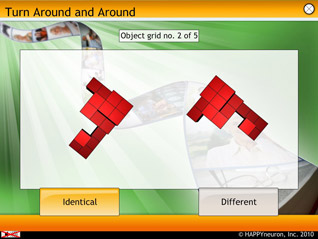
Sample of game screen
-
Program progression rules
- Each game consists of nine levels.
- The patient is invited to start at level 1 and, based on successful performance they may progress to higher levels.
- At any given level achieved, all lower levels are playable
-
The designs of the games have been optimized for the unique needs of people with MCI. For example:
- smaller game problem sets, game hints, unlimited time for completion, along with large fonts and buttons.
- Many of the games are suitable for use with touch screens.
- The patient cognitive profile (compliance and progress) is visible to the therapist and optionally visible to the patient.
- The ideal training intensity for positive outcomes is 30 minutes a day, 5 days a week.
Once you have selected your patient, you can see his/her results.
(Click to enlarge pictures)
The exercises are grouped in modules to ease the process of building an adapted training plan for your patients.
Memory
This module contains games which train long-term memory on both visual and verbal dimensions.
Executive functions
This module is specifically designed to train executive functions, including reasoning (capacity to make deductions from hypotheses) and strategy. It contains language-based tasks and visual activities.
Language
These games train multiple facets of language including comprehension, vocabulary and lexical fluency.
Visual and Spatial Abilities
This module contains games designed to train visual and spatial abilities. It aims at training player's visual mental imagery and more particularly mental rotation in a 3D space.
The table below shows the different patient conditions in which this program is adapted to be used.
| Patient Condition | Notes |
|---|---|
| Mild Cognitive Impairment (MCI) | Age related cognitive impairments and therapies |
| Alzheimer's Disease |
Study
2015-2018: Cognitive and Physical Training in Elderly: Behavioral and EEG study
Size
120 subjects
Research Institution
Laboratoire d'Etude des Mécanismes Cognitifs, Université Lumière Lyon 2, France
Investigator
Clémence Joubert (Ph.D student) & Hanna Chainay, Ph.D.
Status
In Progress
Study
2014-2015: Preparing people marginalized by mental health issues for further education/ employment through Education
Size
25 subjects
Research Institution
George Brown College
Investigator
Jaswant Kaur Bajwa, Alex Irwin
Status
In Progress
Study
2014: Cognitive training to improve language comprehension for seniors?
Size
50 subjects - under recruitment
Research Institution
Jean-Uhrmacher Institut für klinische HNO-Forschung, Klinik und Poliklinik für Neurologie der Uniklinik Köln, Lehrstuhl für Pädagogik und Didaktik hörgeschädigter Menschen
Investigator
Dr. Magdalene Ortmann, Prof. Dr. Harmut Meister, Prof. Dr. Josef Kessler, Prof. Dr. Thomas Kaul
Status
In Progress
Presentation
Study
2012: Conditions for Maximizing Effects of 90 Days of Brain Training
Size
350 subjects
Research Institution
Investigator
Status
Completed
Study
2011: Increased employability of the unemployed aged 50+ through cognitive training?
Size
87 subjects
Research Institution
Investigator
B. Godde, C. M. G. Noack, C. Windisch & C. Voelcker-Rehage
Status
Completed
Study
2008: Cognitive Training Improves Driving Skills
Size
90 subjects
Investigator
Status
Completed
Results
Subjects demonstrate an average of 14% improvement in key skills
Study
2008: Benefits of Online Cognitive Training
Size
217 subjects
Investigator
Bernard Croisile, M.D., Ph.D., Sandrine Bélier, Ph.D., Michel Noir, Ph.D., Franck Tarpin-Bernard, Ph.D., Diana Miner, M.A., M.S., Gaël Allain, Ph.D.
Status
Completed
Results
Subjects demonstrate +8.5% average improvement
Publication
Pending
Study
2007: Alzheimer's patients maintain cognitive skills and improve self confidence
Size
47 subjects
Investigator
Dr. Foare, Sophia's Gardens, Alzheimer's disease clinic, Castelnau-le-Lez, France
Status
Completed
Study
2007: Online Cognitive Training Improves Cognitive Performance
Size
85 subjects
Investigator
Bernard Croisile, M.D., Ph.D., Sandrine Bélier, Ph.D., Michel Noir, Ph.D., Franck Tarpin-Bernard, Ph.D., Gaël Allain, Ph.D.
Status
Completed
Results
85 HAPPYneuron Users show +16% average improvement in 18 weeks
Study
2007: Significant Brain Activity Improvement
Investigator
Robert Bender III, M.D., D.Michael
Funded by
The Center for Disease Control (CDC)
Status
Completed
Results
“Shows Significant Brain Activity Improvement. HAPPYneuron™ Games Key Component of Brain Wellness Program”
Study
2006: Memory Stimulation. Which scientific benefits? Which exercises?
Size
39 subjects
Investigator
Status
Completed
Results
HAPPYneuron Users show +12% average improvement in 18 weeks
Publication
Study
2004-2006: MNESIS Project - Using the internet as a means of social integration and cognitive stimulation in a residential unit for elderlies
Research Institution
Lyon 2 University, Lyon INSA (ICTT), Medica-France
Investigator
Michel C., Bobillier-Chaumon M.-E., Cohen-Montandreau V., Tarpin-Bernard F.
Funded by
French Ministry of Industry
Status
Completed
Presentation
Elderlies in residential home care units. Can ICT be considered as a social rebinding method? In Conférence EUTIC 2006
Publication
Marc-Eric Bobillier Chaumon, Christine Michel, Franck Tarpin Bernard & Bernard Croisile , Behaviour & Information Technology (2013): Can ICT improve the quality of life of elderly adults living in residential home care units? From actual impacts to hidden artefacts, Behaviour & Information Technology, pp 1-17. Click Here to Get an Electronic Copy
Study
2003-2006: The Importance of Memory and Concentration Skills for Schoolchildren
Size
130 subjects school children ages 10 and 11, over a 3 year time frame
Research Institution
City of Elancourt, France ; Association Initiatives Terrain, France ; Lille University, France
Investigator
Neukirch A., Fenouillet F., Hildebrandt R.
Status
Completed
Results
Better CMS score and various effects on recognition tasks.
Publication
Pending
Study
2001-2002: Transferability of Cognitive Training to every-day activities (AKA King 64)
Size
117 subjects children, 10 years old
Research Institution
EMC laboratory (Université Lyon II - CNRS), France
Investigator
Status
Completed
Results
Average of 40%+ improvements in various cognitive skills performance.
Publication


 Previous
Previous